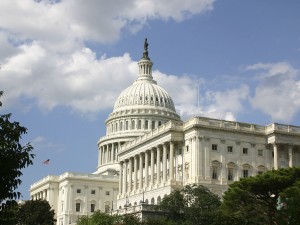Over the last two weeks both chambers of Congress have remained on spring recess and are expected to return next week. Meanwhile, leaders in the Senate are seeking input regarding the Education Sciences Reform Act (ESRA) while the Biden Administration announces new grant opportunities and regulatory proposals.
 Secretary Cardona Set to Testify Next Week
Secretary Cardona Set to Testify Next Week
The House and the Senate are expected to return next week following a two-week recess. When lawmakers return to Capitol Hill, they will likely turn their attention to the fiscal year (FY24) budget and appropriations process among several other priority areas, including the need to raise the nation’s borrowing authority.
As part of this process, U.S. Secretary of Education Miguel Cardona is scheduled to testify before the House Appropriations Committee next Tuesday, April 18. The hearing will focus on the Biden Administration’s recent FY24 budget request to Congress and will provide an opportunity for committee members to examine the proposals contained in the request. This hearing will be the first of several committee discussions on this topic expected to take place over the coming weeks and months as Congress deliberates about the FY24 budget.
ED Seeks Peer Reviewers
The U.S. Department of Education (ED) recently published a request for peer reviewers for a slew of upcoming competitive grant programs administered by the agency. These efforts include upcoming grant competitions authorized by the Carl D. Perkins Career and Technical Education Act’s (Perkins V) Innovation and Modernization (I&M) grant program– a competitive grant initiative overseen by ED’s Office of Career, Technical, and Adult Education (OCTAE). Peer reviewers serve a critical function of objectively reviewing grant applications for various discretionary grants that ED oversees each year, including these forthcoming I&M grants. Those interested in applying to serve as a peer reviewer can do so here.
First Lady Highlights Career Pathway Efforts in Vermont
Last week, First Lady Jill Biden visited an electric aerospace company based in Vermont to highlight the company’s ongoing work in the clean energy sector and its efforts to provide career pathways for local students. The First Lady was joined by U.S. Secretary of Education Miguel Cardona, Vermont Governor Phil Scott, and other federal, state, and local officials. In particular the visit highlighted North Country Career Center, an area technical center serving K-12 students and adult learners in the area, and provides a number of Career Technical Education (CTE) pathways to growing, in-demand sectors of the state’s economy. “What you are doing in this community is the future of our workforce and how we grow our economy from the bottom up and the middle out. These aren’t red ideas or blue ideas. They’re American ideas,” said Biden during the visit. Additional coverage can be found here.
DOL Announces $80 Million in New Grant Funding for Infrastructure Jobs
Last week the U.S. Department of Labor (DOL) announced $80 million in new funding for the Building Pathways to Infrastructure Jobs grant program– an initiative intended to support recent Congressional investments in the nation’s infrastructure, advanced manufacturing, and clean energy sectors. Postsecondary institutions, state and local governments, and other related stakeholders are eligible to apply for grants ranging from $500,000 to $5 million to develop career pathways programs that lead to jobs in these critical sectors of the American economy. More information regarding the funding opportunity announcement can be found here.
Senate HELP Committee Seeks Input on ESRA
Senate Health, Education, Labor, and Pensions (HELP) Committee Chair Bernie Sanders (I-VT) and Ranking Member Bill Cassidy (R-LA) recently issued a request for information (RFI) regarding the Education Sciences Reform Act (ESRA), Educational Technical Assistance Act, and the National Assessment of Education Progress Authorization Act. In particular, the HELP Committee is seeking input from the public and stakeholders on a range of issues that should be addressed in a potential reauthorization of these laws. Among other aspects, these pieces of legislation authorize a wide range of education-related research, technical assistance, and statistical collections. Feedback in response to this request is due by close of business on April 19. A letter outlining a series of questions related to the RFI can be found here.
ED Proposes New Title IX Rule
The U.S. Department of Education (ED) proposed a new rule regarding student athletic eligibility under Title IX—a longstanding federal civil rights law that is intended to prevent sex-based discrimination. The proposal specifically seeks to address the issue of transgender athletes’ eligibility to play on sports teams in accordance with their gender identity. The proposed rule would prevent schools and institutions from adopting or implementing policies that broadly ban transgender students from athletics participation but leaves additional flexibility for schools and institutions to make further determinations based on their unique circumstances. The proposal comes as House Republicans continue to advance legislation (H.R. 734) that would broadly restrict transgender students from participating in school sports. The full proposed rule can be found here and will be open for public comment for 30 days.
Steve Voytek, Policy Advisor


 On Tuesday the Senate Health, Education, Labor and Pensions (HELP) committee voted to advance Betsy DeVos, Donald Trump’s Secretary of Education nominee, out of committee. The vote was narrowly decided along party lines with 12 Republicans voting for and 11 Democrats voting against her nomination.
On Tuesday the Senate Health, Education, Labor and Pensions (HELP) committee voted to advance Betsy DeVos, Donald Trump’s Secretary of Education nominee, out of committee. The vote was narrowly decided along party lines with 12 Republicans voting for and 11 Democrats voting against her nomination.